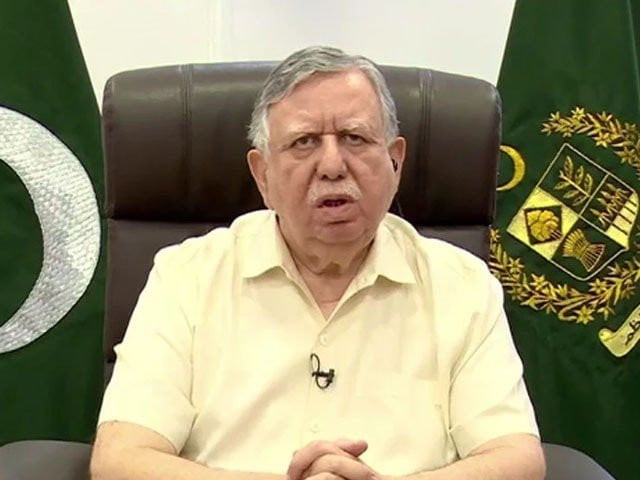Govt will 'retain control' over SBP, Tarin tells NA panel
Tarin, Baqir take lawmakers into confidence over SBP bill; Tarin says govt will appoint of board of directors

Finance Minister Shaukat Tarin on Monday dismissed reports about complete autonomy being granted to the State Bank of Pakistan, saying the government will still “retain control” over the central bank after the passage of the State Bank of Pakistan Amendment Act.
Tarin, who was briefing the National Assembly Standing Committee on Finance that met under the chairmanship of Senator Faizullah Kamoka, said the government will propose names for the SBP board of directors and appoint the board members as well.
“The SBP will not be completely autonomous.”
“IMF told us to stop borrowing money from the State Bank,” he said, adding that the government has not borrowed from the SBP for the past two and a half years anyway. “However, the earlier loans [by the SBP] amount to Rs7,000 billion,” the minister added.
The finance minister further said that in March, Pakistan was given $500 million by the International Monetary Fund (IMF) on strict conditions that were accepted by the government. “But the current legislation is very different with respect to those demands,” he added.
According to Tarin, it had cost Pakistan $60 billion to artificially stop the devaluation of the rupee. At this, PML-N leader Ahsan Iqbal retorted that exports have not increased after the rupee went through a 40 per cent depreciation.
Read Govt under fire in NA over ‘mini-budget’
Briefing the committee, SBP Governor Reza Baqir also claimed that the government will retain full control of the SBP despite the amendments in the law pertaining to the central bank.
He termed the news reports regarding the “auction of the SBP to the IMF” as fake news and said the “draft of the bill is not secret anymore which says that the government will retain control” of the SBP. Baqir said the impression that the IMF is getting control of the central bank is “wrong”.
He added that he used to work for the IMF, but it was not a crime to work in a global financial institution. According to the SBP chief, he was a Pakistani national and didn’t hold another nationality or even a residential permit. “The reports in media over this issues are completely baseless,” he added.
Concerns over SBP bill
On Jan 2, the Prime Minister's Office expressed reservations over the SBP bill and sought deletion of certain parts.
Sources said that the PM’s Office had also raised several other objections over the SBP amendment Bill, 2021, which envisages complete autonomy for the central bank and places a complete restriction on the government's borrowing from the SBP.
The premier’s office had disagreed with giving complete autonomy to the SBP and sought the deletion of section 46 B (4) from the Bill.
The section states: “The bank, the members of the decision-making bodies and its staff shall neither request, nor take any instructions from any person or entity, including the government or quasi-government entities. The autonomy of the bank shall be respected at all times and no person or entity shall seek to influence the members of the board, executive committee, monetary policy committee, or the staff of the bank in the performance of their functions”.
Sources said that the PMO wanted to get section 46 B (4) dropped as the PM will not be able to call the governor even to discuss economic matters, in the event the governor invoked privilege under this section. However, the section still remains part of the bill, tabled in the National Assembly.
The sources said that the PM’s Office also objected to abolishing the Monetary and Fiscal Policies Coordination Board (MFPCB), which had been set up since 1994 to ensure better coordination of monetary and fiscal policies.
Read more Pros and cons of SBP autonomy
The PM’s Office was of the view that abolishing the board would remove any forum for consultation with the Ministry of Finance and the federal government on monetary and exchange rate policies.
The premier’s office was informed that a liaison has been proposed for a mutual consultative mechanism between the Governor SBP and Minister of Finance in place of the board. But the sources said that this liaison cannot be an alternative to the statutory board.
The PM’s Office was also concerned that due to the abolishment of the MFPCB, the federal government will not have control over the monetary policy.
'Better coordination'
On Jan 8, the SBP issued two papers to offer clarity on the issue. It said the proposed law would neither compromise economic sovereignty, nor would it become a “state within a state.
The amendments, it had added, would help in boosting coordination between the finance minister and the SBP governor to better strike a balance between economic growth and inflation reading.
Its officials would remain answerable before parliament and that the National Accountability Bureau and the Federal Investigation Agency (FIA) could investigate alleged criminal matters.
"However, indemnity is being proposed for actions taken in good faith, so that where due care and due process are followed, officials are not afraid to take actions. This is quite common in central bank laws and is considered an international best practice," the paper had added.



1724319076-0/Untitled-design-(5)1724319076-0-208x130.webp)















COMMENTS
Comments are moderated and generally will be posted if they are on-topic and not abusive.
For more information, please see our Comments FAQ